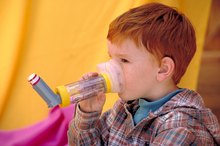Alternatives to Decongestants
When their sinus cavities become clogged with mucus due to a cold, the flu or allergy season, many people turn to oral decongestant tablets like pseudoephedrine, or Sudafed, for relief. Sudafed is not appropriate for some people, including infants and children, pregnant women, or individuals with high blood pressure. Sudafed also has side effects that some consider unpleasant, such as drowsiness or difficulty concentrating. There are, however, safe and effective alternatives to oral decongestants that do not require a prescription.
If you are experiencing serious medical symptoms, seek emergency treatment immediately.
Topical Decongestants
Certain nasal sprays or drops contain decongestants for topical application 3. Commonly used products containing the active ingredient oxymetazoline include Afrin, Vicks, Zicam, and generic versions of these. These nasal sprays are designed to clear nasal and sinus congestion quickly, and with minimal systemic effect. They work by shrinking the size of the blood vessels in your sinus cavity and reducing the associated drainage and swelling. Each product will have different directions for use depending on the brand, so follow the package instructions carefully. Do not use topical decongestants for longer than five days in a row, because of the risk of rebound congestion when the medication is stopped. Topical decongestants are not appropriate for infants or pregnant women, and people with high blood pressure should check with their physician before using these products.
- Certain nasal sprays or drops contain decongestants for topical application 3.
- Topical decongestants are not appropriate for infants or pregnant women, and people with high blood pressure should check with their physician before using these products.
Antihistamines
The Best Allergy Medicine for High Blood Pressure
Learn More
Antihistamines can help reduce nasal congestion by blocking the action of histamine, a chemical that stimulates mucus production in the sinuses. Antihistamines work best if they are taken on a regular schedule to prevent congestion, and are appropriate for treating congestion due to colds, the flu and seasonal allergies. There are many different antihistamines, so read the package label carefully to determine the appropriate dose and schedule. Certain antihistamines are approved for use in children older than two years, pregnant women, and people with high blood pressure. Talk to your doctor or pharmacist about which antihistamine would be most appropriate for you.
- Antihistamines can help reduce nasal congestion by blocking the action of histamine, a chemical that stimulates mucus production in the sinuses.
- Antihistamines work best if they are taken on a regular schedule to prevent congestion, and are appropriate for treating congestion due to colds, the flu and seasonal allergies.
Saline Nasal Sprays/Drops
Saline nasal sprays and drops are chemical-free, non-medicated alternatives to decongestants. Saline, a mixture of salt and water, can be used as often as required, and is safe for anyone, including infants. These saline nasal sprays and drops work by thinning the mucus in the sinus cavities, which relieves congestion and allows free air flow.
Saline Irrigation
The Best Seasonal Allergy Medications
Learn More
A more complete cleansing of the nasal passages is achieved with saline irrigation. This process involves flushing the sinus cavities and nasal passages with a larger quantity of saline solution. The saline solution dissolves mucus and frees nasal passages of congestion. The process is less transportable than saline sprays and drops; it requires a sink or basin to capture the used solution. Saline irrigation solutions can be purchased from commercial retailers or mixed at home. The saline solution is flushed into one nostril, flows through the sinus cavities, and exits through the other nostril, rinsing the mucus from the nasal passages.
- A more complete cleansing of the nasal passages is achieved with saline irrigation.
- The saline solution is flushed into one nostril, flows through the sinus cavities, and exits through the other nostril, rinsing the mucus from the nasal passages.
Steam/Water Vapor
Hot or cool water vapor from a shower, humidifier or vaporizer can also moisturize the air, which helps thin the mucus that causes congestion. Hot water vaporizers and cool water humidifiers are less effective at treating congestion than medications and saline rinses, but can help prevent congestion by adding water to mucus and preventing it from becoming too thick. It is also important to stay hydrated, particularly in dry climates, as this will also help keep nasal mucus thin enough to remove easily by blowing the nose.
Related Articles
References
- Loratadine Prescribing Information
- Drugs.com:Oxymetazoline Nasal Prescribing Information
- Oregon Health Sciences University Pediatric Otolaryngology. Saline nasal sprays and irrigation.
- Thieme U, Müller K, Bergmann C, et al. Randomised trial on performance, safety and clinical benefit of hyaluronic acid, hyaluronic acid plus dexpanthenol and isotonic saline nasal sprays in patients suffering from dry nose symptoms. Auris Nasus Larynx. 2020. doi:10.1016/j.anl.2020.01.008
- Cleveland Clinic. Nosebleed (epistaxis): Prevention. Updated October 23, 2019.
- American Academy of Otolaryngology—Head and Neck Surgery. Post-nasal drip. 2020.
- MedlinePlus. Oxymetazoline nasal spray. Updated September 15, 2016.
- Cleveland Clinic. Nasal sprays work best when you use them correctly—here’s how. October 2016.









